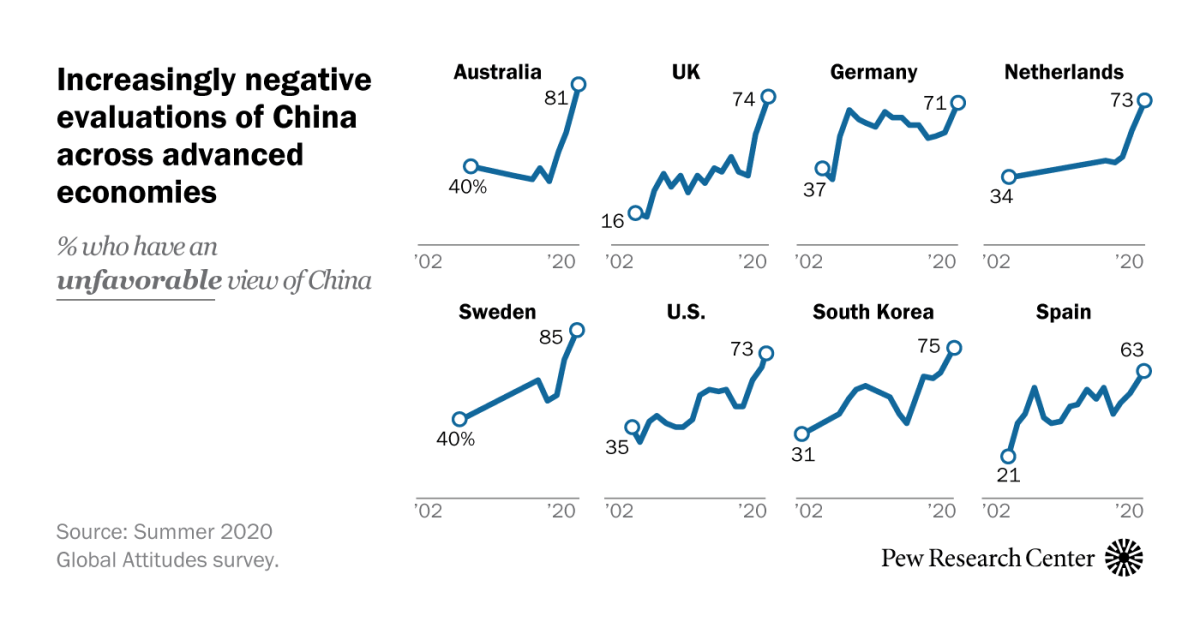Unfavorable Views of China Reach Historic Highs in Many Countries
Majorities say China has handled COVID-19 outbreak poorly
BY
LAURA SILVER,
KAT DEVLIN AND
CHRISTINE HUANG
TABLE OF CONTENTS
How we did this
Views of China have grown more negative in recent years across many advanced economies, and unfavorable opinion has soared over the past year, a new 14-country Pew Research Center survey shows. Today, a majority in each of the surveyed countries has an unfavorable opinion of China. And in Australia, the United Kingdom, Germany, the Netherlands, Sweden, the United States, South Korea, Spain and Canada, negative views have reached their highest points since the Center began polling on this topic more than a decade ago.
Negative views of China increased most in Australia, where 81% now say they see the country unfavorably, up 24 percentage points since last year. In the UK, around three-quarters now see the country in a negative light – up 19 points. And,
in the U.S., negative views of China have increased nearly 20 percentage points since President Donald Trump took office, rising 13 points since just last year.
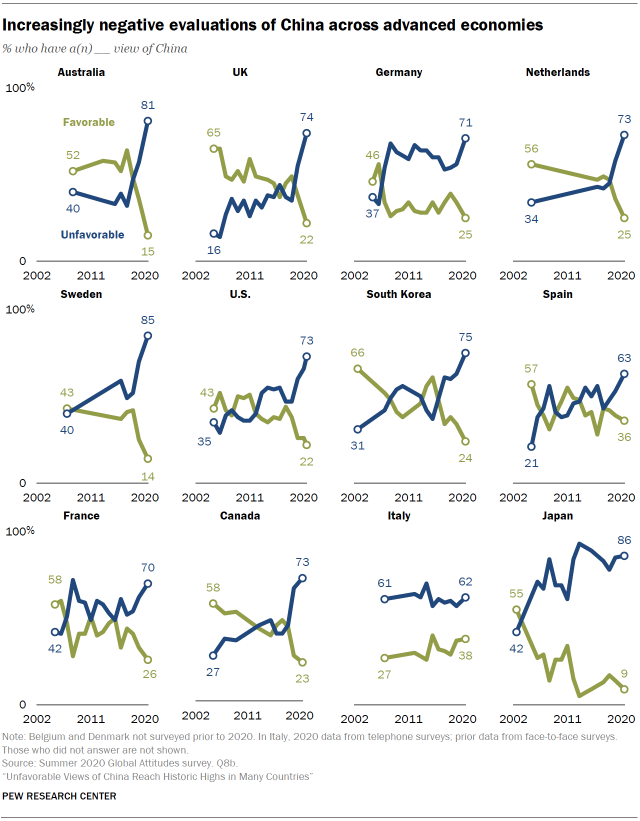
The rise in unfavorable views comes amid widespread criticism over how China has handled the
coronavirus pandemic. Across the 14 nations surveyed, a median of 61% say China has done a bad job dealing with the outbreak. This is many more than say the same of the way the COVID-19 pandemic was handled by
their own country or by
international organizations like the World Health Organization or the European Union. Only the U.S. receives more negative evaluations from the surveyed publics, with a median of 84% saying the U.S. has handled the coronavirus outbreak poorly.
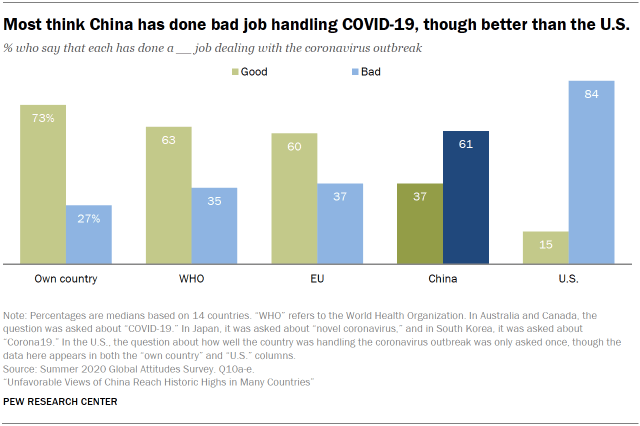
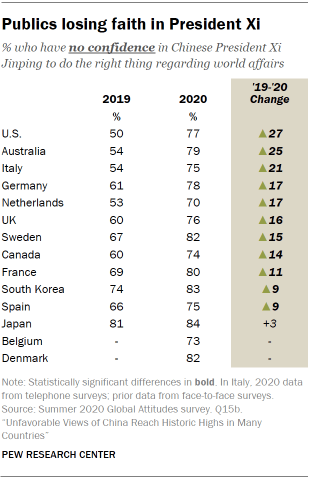
Disapproval of how China has handled the COVID-19 pandemic also colors people’s confidence in Chinese President Xi Jinping. A median of 78% say they have not too much or no confidence in him to do the right thing regarding world affairs, including at least seven-in-ten in every country surveyed. This lack of confidence in Xi is at historic highs in every country for which trend data is available except Japan and Spain. In most countries, the percent saying they have not too much or no confidence in him has grown by double digits since last year. For example, in the Netherlands, whereas around half distrusted Xi last year, today 70% say the same – up 17 percentage points.
But, even as concerns about Xi rise, in most countries,
more have faith in President Xi than in President Trump. For example, in Germany, 78% say they have no confidence in Xi – but 89% say the same of Trump. Still, while Xi’s global image is somewhat better than Trump’s, it nonetheless is significantly
worse than several of the other world leaders asked about, including German Chancellor Angela Merkel, French President Emmanuel Macron and UK Prime Minister Boris Johnson.
When it comes to perceptions of economic strength, China fares relatively well in the survey. Of four options given, people in most countries polled are most likely to see China as the world’s top economy. This is particularly true in Europe, where a plurality or majority in every country surveyed says China is the world’s leading economic power. Outside of the U.S. itself –
where 52% of Americans say the U.S. is the world’s leading economic power – only in Japan (53%) and South Korea (77%) do more name the U.S. than China.
But even while pluralities or majorities in most countries note China’s economic strength relative to the U.S., this opinion does little to color attitude toward China more broadly. In almost every country surveyed, people who name China as the top economic power and people who name the U.S. are equally likely to have unfavorable views of China. People’s own pocketbooks also have little bearing on their views of China. In most countries surveyed, those with higher income levels are equally likely as those with lower levels of income to give the country low marks.
1
These are among the findings of a new Pew Research Center survey, conducted June 10 to Aug. 3, 2020, among 14,276 adults in 14 countries.
Negative views of China on the rise
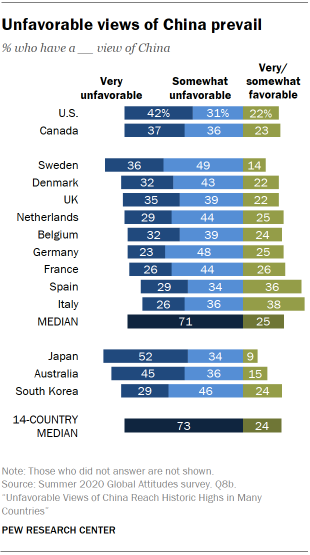
A majority in each of the 14 countries surveyed has an unfavorable view of China. In most countries, around three-quarters or more see the country in a negative light. In Spain, Germany, Canada, the Netherlands, the U.S., the UK, South Korea, Sweden and Australia, negative views have reached their highest level in the 12 or more years that Pew Research Center has been polling in these countries.
Around a third or more in Belgium, Denmark, the UK, Sweden, Canada, the U.S., Australia and Japan also have
very unfavorable views of China. In both the UK and Australia, this is more than twice as many as said they had very unfavorable views of China last year.
In most countries, views soured significantly since just last year. For example, in Australia – where
efforts to investigate China’s role in the spread of COVID-19 have led to
heated trade frictions – negative views of China have gone up 24 percentage points since 2019. This is also the largest year-on-year change in Australia since the question was first asked in 2008.
Negative views increased by double digits over the past year in the UK, Germany, the Netherlands, Sweden, the U.S., South Korea and Spain.
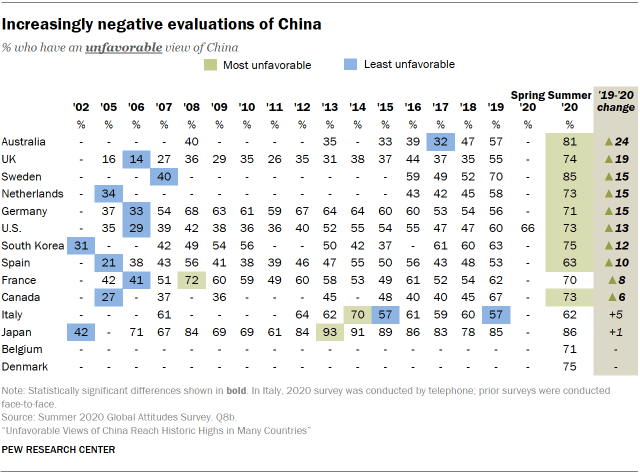
While these changes since last year are stark, in some countries, they are part of a larger trajectory.
In the U.S., for example, unfavorable opinion of China has ticked up steadily since 2018. Similarly, in South Korea, the UK, the Netherlands, Canada and Sweden, this marks the second year in a row where
negative views have reached historic highs.
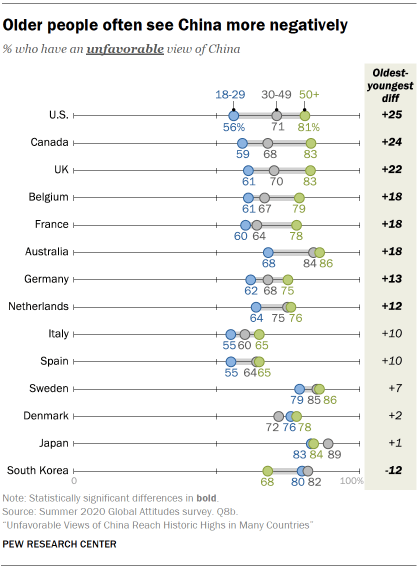
As has traditionally been the case in Pew Research Center polling, older people tend to have more unfavorable views of China than younger people. For example, in Australia, 68% of those under 30 have an unfavorable view of China, compared with 86% of those ages 50 and older. This also marks the first year in which a majority of younger Australians have an unfavorable view of China; in 2019, 45% of those under 30 reported the same.
In the U.S., too, 2020 is the first year in which more than half of young Americans expressed negative views toward China. The only country surveyed in which younger people hold
more unfavorable views of China than their elders is South Korea.
In contrast, education plays little role in people’s assessments of China. Across each of the 14 countries surveyed, those with a postsecondary degree or more are equally likely to have unfavorable views of China as those with less education. Men and women are also equally likely to have unfavorable views of China in nearly all countries surveyed.
In the U.S., Republicans and independents who lean toward the Republican Party hold
more unfavorable views of China than Democrats and independents who lean toward the Democratic Party. Aside from the U.S. – where conservatives tend to have more unfavorable views of China than liberals – ideology has little or no relationship with views of China in the other countries surveyed.
Most think China has not handled COVID-19 outbreak well
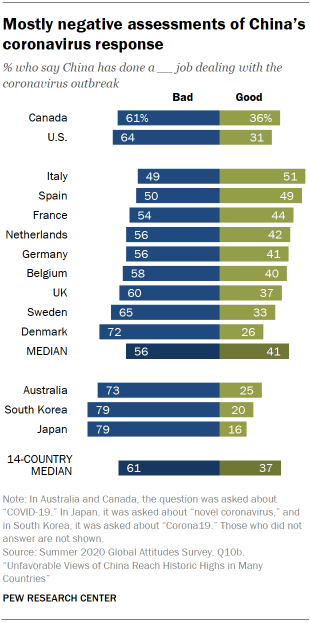
After initial cases of the coronavirus started appearing in China’s Hubei Province in late 2019, many around the world
questioned the expediency of China’s response to the outbreak, and others critiqued
some of the measures Beijing used to contain the virus within its borders. But in Wuhan, the original epicenter of the outbreak,
the strict lockdown has ended and the new case count plummeted to at or near zero by May.
Among the 14 advanced economies surveyed, most rate China’s COVID-19 response negatively. A median of 61% say China has done a bad job dealing with the coronavirus outbreak, while 37% believe the country has done a good job.
At least six-in-ten in Canada and the U.S. rate China’s handling of the coronavirus as poor. More than half in seven European nations share this view, including 72% in Denmark and 65% in Sweden. Spaniards and Italians are split, with nearly equal shares saying China has handled the pandemic well versus not well.
The most negative reviews of China’s COVID-19 response come from three nations in the Asia-Pacific region. More than seven-in-ten in Japan, South Korea and Australia say China has done a bad job dealing with the coronavirus outbreak, including more than four-in-ten in each country who say they did a
very bad job.
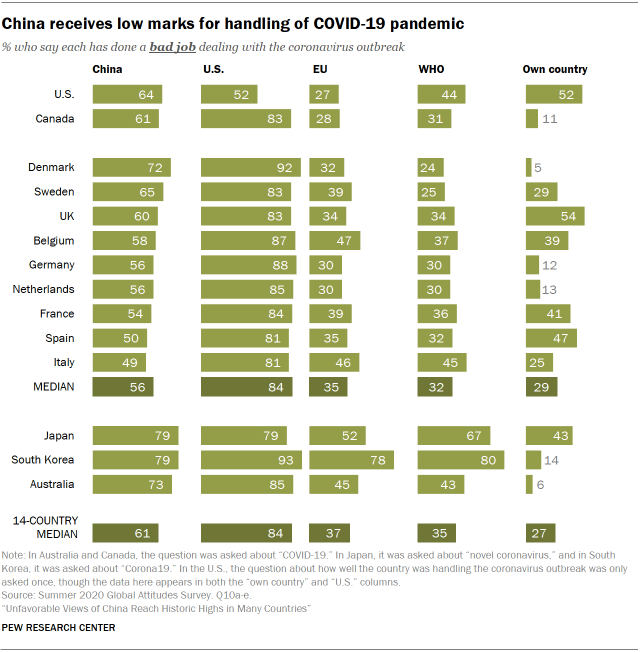
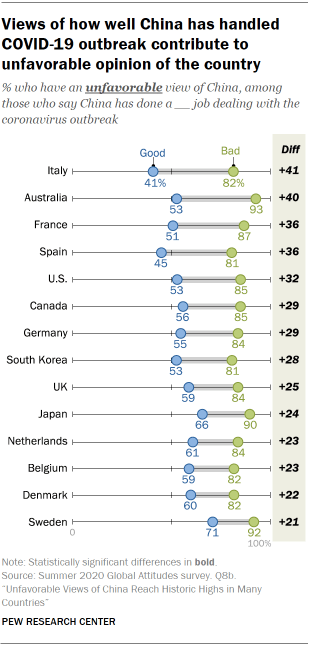
Assessments of China’s handling of the coronavirus outbreak are generally much more negative than those given to other nations and institutions. Publics give the highest ratings to their
own country’s coronavirus response (median of 73% good job). And a median of about six-in-ten say the World Health Organization and European Union have done a good job dealing with the coronavirus. The exception to this pattern comes in
assessments of the United States’ handling of the virus, which receives even more negative ratings on its COVID-19 strategy: A median of 84% believe the American response to the pandemic has been bad, while just 15% rate it as good.
Perceptions of how well China has done handling the coronavirus pandemic color people’s overall views of the country. Those who think China has done a bad job dealing with COVID-19 are much more likely to have an unfavorable view of the country – and the difference is at least 20 percentage points in every country surveyed. For example, in Italy, those who say China has done a bad job handling the coronavirus pandemic are twice as likely to report an unfavorable view of China – 82% vs. 41%, respectively.
In Europe, more see China as world’s top economic power than U.S.

Many major economies are
predicted to contract in 2020 amid the pandemic, including those of the U.S., Japan and the euro area. In contrast, the Chinese economy is expected to achieve positive, if modest, growth. Across the 14 countries surveyed, when asked to evaluate the relative economic standing of these areas, a median of 48% identify China as the world’s leading economic power. The U.S. comes second, with a median of 35% seeing it as the world’s top economic power.
2 Few see Japan or EU countries similarly.
In most European countries surveyed, about half or more consider China the world’s top economy, compared with about a third who say the same about the U.S. Evaluations of China’s economic standing have a double-digit edge on evaluations of the U.S. economy in seven of the nine European countries. For example, Belgians are 22 percentage points more likely to say China is the top economy than to name the U.S. (54% vs. 32%). At least one-in-ten in Germany, Denmark and the Netherlands also name the countries of the EU as the world’s leading economic power – the highest among all countries surveyed.
South Korea and Japan are the only two countries – aside from the U.S. itself – where more see the U.S. as the world’s leading economy than China. South Koreans are particularly likely to name the U.S., with 77% naming the U.S. as the dominant global economy.
Over the past few years, evaluations of these countries’ international economic standing have generally held steady in the countries surveyed. Such evaluations also do not differ across different age groups and education or income levels, but men are more likely than women to say the U.S. is the world’s leading economic power in half of the countries surveyed.
Little confidence in President Xi to do the right thing in world affairs
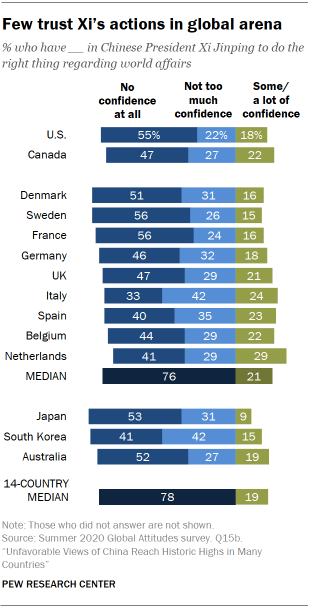
Across the 14 countries surveyed, a median of 78% say they have no confidence in Chinese President Xi to do the right thing when it comes to international affairs, with at least seven-in-ten in every country saying they lack confidence in Xi. Only a median of 19% express any trust.
In the U.S., a majority say they have
no confidence at all in Xi (55%), and about half in Canada say the same (47%). No more than a quarter report having any confidence in him in either country.
Europeans report similarly low levels of trust in Xi. A third or more in each country surveyed say they have no confidence at all in the Chinese president, including at least half in Sweden, France and Denmark.
About half in Japan and Australia also say they have no confidence
at all in Xi. Japan also stands out as a country where less than 0.5% of the public – effectively
no one – reports having a lot of confidence in China’s president, though no more than 5% report having a lot of confidence in him in any country surveyed.
The survey also asked about
confidence in five other world leaders. Only confidence in U.S. President Trump is lower than confidence in Xi. When considering median confidence, Russian President Vladimir Putin receives slightly higher marks, while confidence in European leaders Merkel, Macron and Johnson are at least twice as high as in Xi.
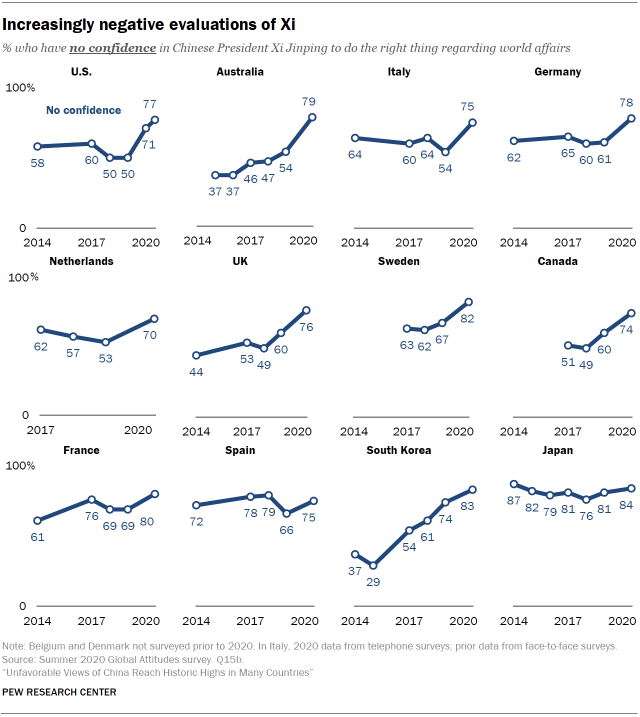
Distrust in President Xi has reached unprecedented highs in all countries for which past data is available except for Japan and Spain. The increase in distrust has been especially sharp in the last year; nine of 12 countries have seen a double-digit increase in the share who say they have no confidence in Xi. In Australia, for example, 54% had little or no confidence in Xi in 2019, and now 79% say the same, a 25 percentage point increase.
Confidence in Xi is low among men and women, those with higher and lower levels of education, across age groups and among those with higher and lower incomes.

It is also closely related to people’s assessments of how China is handling the coronavirus outbreak. People who think China has done a good job handling COVID-19 are more likely to have confidence in the Chinese president. For instance, 38% of Spaniards who compliment China’s outbreak response trust Xi compared with 9% of those who do not – a 29 percentage point difference. Still, no more than about four-in-ten of those who rate China’s coronavirus outbreak response positively say they trust Xi.
Across 14 advanced nations, a median of 61% say China has done a bad job in handling the coronavirus outbreak. And at least seven-in-ten in each of these countries have little or no confidence in President Xi Jinping.

www.pewresearch.org














